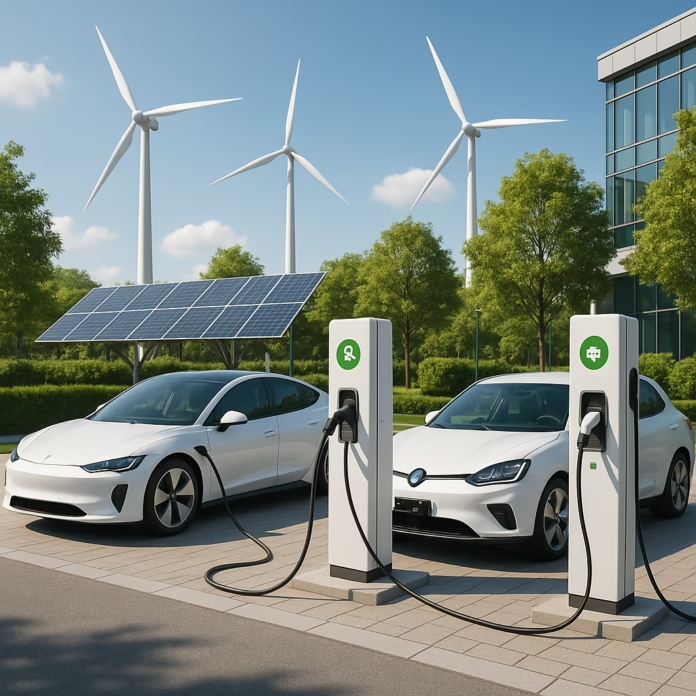The Shift Toward Cleaner Transportation
The transportation sector is one of the largest contributors to greenhouse gas emissions globally. As governments and industries seek ways to meet ambitious climate targets, electric vehicles (EVs) have emerged as a critical solution. Europe, in particular, is accelerating its transition from fossil fuel-powered cars to battery electric vehicles (BEVs), driven by cleaner electricity production and stricter emissions regulations. This shift is not only crucial for reducing air pollution but also for achieving long-term sustainability goals.
Recent studies confirm that the environmental advantages of EVs are increasing as renewable energy sources become a larger part of the electricity mix. The growing deployment of wind, solar, and other clean energy technologies is making electric cars progressively cleaner during their entire life cycle—from production to disposal. This transformation is reshaping the automotive market and offering consumers a more sustainable mobility option.
Battery Electric Vehicles Deliver Unmatched Emission Reductions
A new comprehensive life-cycle analysis by the ICCT shows that BEVs sold in Europe today produce 73% fewer greenhouse gas emissions over their lifetime than comparable gasoline vehicles. This figure includes emissions from vehicle and battery manufacturing, fuel production, usage, maintenance, and recycling. Notably, this represents a 24% improvement compared to estimates from 2021, reflecting the rapid decarbonization of Europe’s electricity grid.
While BEVs have about 40% higher emissions during production due to battery manufacturing, this “emissions debt” is offset after driving approximately 17,000 kilometers—typically within the first one to two years of use. After this point, BEVs continue to deliver significant climate benefits throughout their operational life.
The Role of Europe’s Cleaner Electricity Mix
Europe’s electricity generation is rapidly shifting toward renewables. By 2025, renewable sources are expected to account for 56% of electricity production, rising to 86% by 2045. This cleaner grid further enhances the climate advantage of BEVs, which rely on electricity rather than fossil fuels. In contrast, internal combustion engine vehicles (ICEVs) continue to depend largely on fossil fuels, limiting their potential for emission reductions.
Comparing Other Powertrain Technologies
While hybrids and plug-in hybrids offer some emissions reductions—20% and 30% respectively—they fall short of the substantial cuts achieved by BEVs. This is partly because plug-in hybrids are often driven less on electricity than assumed, diminishing their climate benefits. Hydrogen fuel cell vehicles can also reduce emissions significantly (up to 79%) but only when powered by renewable hydrogen, which is currently scarce in Europe. Most hydrogen today is produced from natural gas, resulting in emissions reductions closer to 26%, similar to hybrids.
Addressing Misinformation and Data Transparency
The ICCT study also tackles widespread misinformation about EV emissions. Critics often cite higher battery production emissions to argue against EV benefits. However, the study’s real-world data and comprehensive methodology show that these initial emissions are quickly offset by cleaner operation. The analysis includes vehicle lifetime, evolving electricity grids, and actual usage patterns. And provides a transparent and accurate picture of EV environmental impacts.
Dr. Georg Bieker from ICCT emphasizes that analysts must ground life-cycle analysis in representative data rather than rely on selective assumptions. This clarity is essential for policymakers, industry leaders, and consumers to make informed decisions about the future of transportation.
The Path Forward for Sustainable Mobility
To meet Europe’s climate goals, phasing out new registrations of ICEVs, hybrids, and plug-in hybrids by 2035 is critical. Expanding charging infrastructure, decarbonizing battery production, and further greening the electricity grid will accelerate EV adoption. And maximize their environmental benefits. As EVs become the dominant technology on European roads, they will play a pivotal role in reducing transport emissions and improving air quality.
Electric vehicles are not just a trend—they are a fundamental shift toward cleaner, smarter transportation. This latest ICCT research confirms that BEVs are the best available technology to significantly cut greenhouse gas emissions and help Europe achieve its climate ambitions. Consumers and policymakers alike can now rely on robust, science-backed evidence to support the transition to electric mobility.







